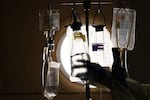
FILE - A nurse checks a patient's IV fluids at Providence Holy Cross Medical Center in Los Angeles in 2021. A national shortage of IV fluids forced OHSU to postpone 108 surgeries scheduled for this week. Hurricane Helene knocked a North Carolina factory offline, owned by Baxter International, which produces about half the IV fluids used by hospitals around the country.
Jae C. Hong / AP
A national shortage of IV fluids forced OHSU to postpone 108 surgeries scheduled for this week.
Hurricane Helene knocked a North Carolina factory offline, owned by Baxter International. It produces about half the IV fluids used by hospitals around the country.
The IV fluids in short supply include saline, electrolytes and dextrose. They are among the most common treatments hospitals give patients during surgeries, in intensive care, and in the emergency department.
OHSU Health interim CEO Joe Ness discussed the shortage with the OHSU board of directors’ finance and audit committee in a public meeting Friday.
OHSU, he said, relies heavily on Baxter for IV fluids, making it one of the most impacted hospitals in the state. Other local health systems, like Legacy Health and Kaiser, work with a different supplier, B. Braun.
“We’re managing through it, but it is very tough. It does remind us of COVID days,” Ness told the board.
The next four to six weeks, according to Ness, will be the most difficult.
Over the past few days and into early next week, OHSU has rescheduled roughly 25% of its surgical cases, according to spokesperson Sara Hottman.
Non-urgent surgeries being rescheduled include bariatric surgery, joint repair surgery and hernia repair surgery. OHSU is communicating directly with affected patients.
Baxter has put a rationing system in place to fairly distribute its remaining IV fluids to its customers. The company had some products in warehouses and was able to salvage more than 450 truckloads of fluids from its flooded factory.
Ness said a new allocation from the manufacturer just arrived, doubling OHSU’s IV fluid supply heading into the next week.
OHSU has also received some fluids from Legacy Health to help with the shortage.
“We keep a backup of supplies for situations such as these,” a Legacy spokesperson wrote. “We will continue to help health partners where we can on a case-by-case basis.”
To ease the shortage, the federal government announced this week it has eased some production regulations and is working with Baxter to airlift fluids produced in its factories overseas. The first flights are scheduled to arrive on Oct. 19.
Baxter has said it hopes to return its factory to full production, with assistance from the government, by the end of the year.
Nathan Selden, dean of the OHSU School of Medicine, said the health care industry may need to rethink the strategy of trying to drive down prices by using a single source supplier.
“It does create supply chain vulnerabilities,” he said. “Getting that balance right is a larger strategic question.”
